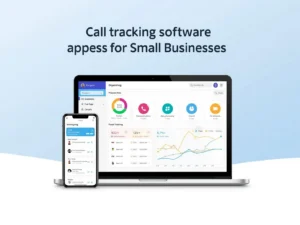Introduction: Why Call Tracking Matters for Small Businesses (2025 Guide)
For most small businesses, the phone is still the lifeline. Every ring could be a new customer asking about services, a loyal client placing another order, or a hot lead requesting a quote. But here’s the tricky part—do you actually know which of your marketing efforts are making the phone ring?
If you can’t answer that with confidence, you’re essentially marketing blindfolded. You may be spending hundreds or even thousands on campaigns that aren’t driving real results. That’s exactly where call tracking software steps in.
Instead of guessing, call tracking connects your online and offline marketing, showing you which channels, ads, and keywords are truly generating phone leads. For a small business, where every dollar counts, this insight is game-changing. By knowing what works, you can cut wasted spend, double down on profitable channels, and grow your return on investment (ROI).
👉 Already curious? Explore VoiceTotal’s call tracking features to see how you can start measuring ROI today.
The Benefits of Call Tracking for SMBs
Call tracking is much more than just logging numbers. Done right, it can completely change how you approach marketing and sales. Let’s break down the biggest advantages:
-
Attribute Calls to Marketing Channels
Understand exactly which sources—Google Ads, Facebook, SEO, or even a direct mail flyer—are generating phone calls. -
Optimize Your Marketing Spend
Shift budget away from weak campaigns and fuel the ones bringing high-quality calls. -
Improve Lead Quality
Identify which campaigns attract your best customers, then adjust your targeting. -
Enhance Customer Experience
Many tools (including VoiceTotal) offer call recording, helping you train staff and improve customer service. -
Measure Offline Conversions
For businesses where sales happen mostly over the phone—contractors, healthcare providers, real estate—call tracking gives you conversion data that Google Analytics alone can’t. -
Personalize Interactions
With CRM integrations, agents see caller history before picking up, leading to more personal conversations. -
A/B Test Campaigns
Use different tracking numbers for ad variations to quickly see what performs better. -
Understand Geographic Performance
Learn which locations drive the most calls and fine-tune your local marketing.
Key Features to Look for in Call Tracking Software
Not all call tracking platforms are created equal. As a small business, you’ll want to make sure the software checks these boxes:
-
Dynamic Number Insertion (DNI): Automatically shows different phone numbers based on how a visitor found your site.
-
Call Attribution: Link calls back to specific campaigns, keywords, or ads.
-
Call Recording: Train staff and maintain quality (be sure to follow local call recording laws).
-
Integrations: Must sync with Google Analytics, Google Ads, CRMs like HubSpot or Salesforce.
-
Reporting & Analytics: Clear dashboards to track volume, duration, and conversion rates.
-
Whisper Messages & Call Routing: Tell agents where a call originated and route it to the right department.
-
SMS Tracking: For businesses that text customers, this is a must.
-
Spam Filtering: Eliminate robocalls so they don’t skew your data.
-
Affordability & Scalability: Pricing that works for now but grows as you do.
-
Ease of Use: You shouldn’t need an IT department to run it.
For more details, check out VoiceTotal’s bulk tools—including CSV imports, auto-routing, and real-time validation to launch campaigns at scale.
Best Call Tracking Software for Small Businesses
After testing and comparing leading tools, here’s how the most popular options stack up:
1. CallRail
Often called the gold standard. Easy to use, deep attribution, great integrations, plus conversation intelligence powered by AI.
Pros: Rich insights, clean interface, strong CRM integrations.
Cons: Can be pricier for higher call volumes.
2. WhatConverts
Goes beyond calls—tracks forms, chats, and even e-commerce. Great for businesses juggling multiple lead sources.
Pros: Complete lead management, affordable for value.
Cons: Dashboard can feel crowded for beginners.
3. Invoca
An enterprise-grade solution with scaled-down SMB options. Known for predictive analytics and advanced AI.
Pros: Superior conversation intelligence.
Cons: High price point, best for larger SMBs.
4. DialogTech (Engage by Fluent)
Focused heavily on call attribution and agent performance. Great for businesses with heavy phone sales.
Pros: Strong call routing & analytics.
Cons: Pricing higher than some alternatives.
5. Convirza
Unique in its focus on sales coaching and scoring calls to help reps improve.
Pros: Sales feedback tools built in.
Cons: Interface feels dated, learning curve.
6. CallTrackingMetrics
Extremely versatile—handles everything from small agencies to large call centers.
Pros: Comprehensive features, agency-friendly.
Cons: Feature overload for very small teams.
How to Choose the Right Call Tracking Software
Picking the right solution depends on your goals and budget. A few tips:
-
Define your goals: Do you just need attribution, or also sales coaching and call intelligence?
-
Assess your budget: Most tools bill per number and minute.
-
Prioritize features: DNI, recording, and analytics are non-negotiable.
-
Check integrations: Ensure it works with your CRM, Google Ads, and Analytics.
-
Test usability: Choose software your team will actually use without frustration.
-
Start small, scale later: Most providers offer flexible tiered plans.
Final Thoughts
In today’s competitive landscape, small businesses can’t afford to waste marketing dollars. Call tracking is no longer optional—it’s essential. With the right tool, you’ll know exactly which campaigns drive real phone leads, improve customer interactions, and boost ROI.
If you’re ready to see how it works, start with VoiceTotal’s free 7-day trial and take control of your phone leads today.
For further reading on marketing ROI, you can check resources like HubSpot’s guide to call tracking or Neil Patel’s blog on marketing attribution.

